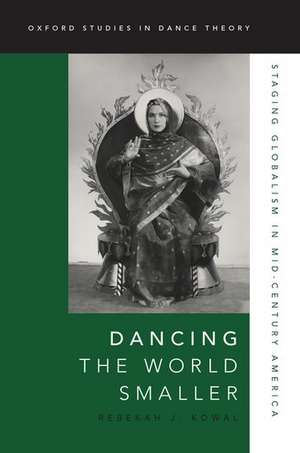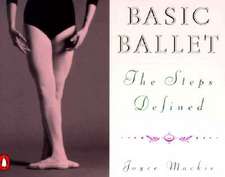Dancing the World Smaller: Staging Globalism in Mid-Century America: Oxford Studies in Dance Theory
Autor Rebekah J. Kowalen Limba Engleză Paperback – 9 ian 2020
| Toate formatele și edițiile | Preț | Express |
|---|---|---|
| Paperback (1) | 246.84 lei 31-37 zile | |
| Oxford University Press – 9 ian 2020 | 246.84 lei 31-37 zile | |
| Hardback (1) | 578.73 lei 31-37 zile | |
| Oxford University Press – 9 ian 2020 | 578.73 lei 31-37 zile |
Preț: 246.84 lei
Nou
Puncte Express: 370
Preț estimativ în valută:
47.25€ • 51.34$ • 39.71£
47.25€ • 51.34$ • 39.71£
Carte tipărită la comandă
Livrare economică 10-16 aprilie
Preluare comenzi: 021 569.72.76
Specificații
ISBN-13: 9780190265328
ISBN-10: 0190265329
Pagini: 296
Dimensiuni: 155 x 231 x 18 mm
Greutate: 0.43 kg
Editura: Oxford University Press
Colecția OUP USA
Seria Oxford Studies in Dance Theory
Locul publicării:New York, United States
ISBN-10: 0190265329
Pagini: 296
Dimensiuni: 155 x 231 x 18 mm
Greutate: 0.43 kg
Editura: Oxford University Press
Colecția OUP USA
Seria Oxford Studies in Dance Theory
Locul publicării:New York, United States
Recenzii
I recommend the book with no reservations to researchers and dance practitioners, undergraduate and graduate students, and to anyone who believes that dance, as the book beautifully demonstrates, connects people. Showing that dance can 'make the world smaller,' Kowal's work brings us closer to the hope that our bodies and minds can overcome the complex challenges of our time and make the world better.
Understanding the postwar period through the actions of US globalism is crucial to identifying and dismantling white supremacist institutions established to support the country's power, especially as we witness the gears of history churning out new world orders. Kowal's significant book is instructive for readers in dance, theatre, and performance studies, as well as for students of national-ism, imperialism, and American history, who seek to ascertain how the past constructed our present and how to use cultural mechanisms to improve our collective futures.
Throughout this work, Kowal's nuanced analysis uncovers the paradoxes of ethnic dance, which catalyzed new forms of cultural inclusion even as it enacted ideas of white supremacy.
The circumstances of La Meri and other artists and festival events discussed throughout are a rich resource for students and teachers willing to ask: Who and what is missing in this story? Such questions make Dancing the World Smaller a model for how to bring research to life, while also judiciously reminding us that history can offer poignant perspectives for what is happening in the cultural world of today.
Dancing the World Smaller offers a fascinating, richly layered account of the literal and figurative choreography by which a transnational assembly of dancers, critics, and impresarios helped mid-century New York lay claim to the status of a global city and helped the U.S. model itself as home to a new globalist imaginary ... Rebekah Kowal masterfully tracks the cultural factions and frictions that energized this lost chapter of dance history, and the result is a remarkable story that speaks just as meaningfully to our own fraught moment in global social and cultural politics.
In Dancing the World Smaller, Kowal documents a phenomenon that has largely escaped scholarly notice: the widespread interest in stagings of 'global' dance forms in New York City in the middle of the twentieth century. Based on extensive archival research, the book not only makes a compelling case for considering 'ethnic dance' alongside the dominant form of modern dance, but also shows how performances of cultural 'otherness' registered the tensions and ambivalence of US foreign policy. In the process, Kowal deftly historicizes and theorizes one of our most fundamental assumptions about dance -- its ability to bridge difference.
With Dancing the World Smaller, Kowal makes a significant contribution to the fields of dance history, political cultural studies, and dance research, in general.
Understanding the postwar period through the actions of US globalism is crucial to identifying and dismantling white supremacist institutions established to support the country's power, especially as we witness the gears of history churning out new world orders. Kowal's significant book is instructive for readers in dance, theatre, and performance studies, as well as for students of national-ism, imperialism, and American history, who seek to ascertain how the past constructed our present and how to use cultural mechanisms to improve our collective futures.
Throughout this work, Kowal's nuanced analysis uncovers the paradoxes of ethnic dance, which catalyzed new forms of cultural inclusion even as it enacted ideas of white supremacy.
The circumstances of La Meri and other artists and festival events discussed throughout are a rich resource for students and teachers willing to ask: Who and what is missing in this story? Such questions make Dancing the World Smaller a model for how to bring research to life, while also judiciously reminding us that history can offer poignant perspectives for what is happening in the cultural world of today.
Dancing the World Smaller offers a fascinating, richly layered account of the literal and figurative choreography by which a transnational assembly of dancers, critics, and impresarios helped mid-century New York lay claim to the status of a global city and helped the U.S. model itself as home to a new globalist imaginary ... Rebekah Kowal masterfully tracks the cultural factions and frictions that energized this lost chapter of dance history, and the result is a remarkable story that speaks just as meaningfully to our own fraught moment in global social and cultural politics.
In Dancing the World Smaller, Kowal documents a phenomenon that has largely escaped scholarly notice: the widespread interest in stagings of 'global' dance forms in New York City in the middle of the twentieth century. Based on extensive archival research, the book not only makes a compelling case for considering 'ethnic dance' alongside the dominant form of modern dance, but also shows how performances of cultural 'otherness' registered the tensions and ambivalence of US foreign policy. In the process, Kowal deftly historicizes and theorizes one of our most fundamental assumptions about dance -- its ability to bridge difference.
With Dancing the World Smaller, Kowal makes a significant contribution to the fields of dance history, political cultural studies, and dance research, in general.
Notă biografică
Rebekah J. Kowal is Professor of Dance at The University of Iowa and author of How to Do Things with Dance: Performing Change in Postwar America and co-editor with Randy Martin and Gerald Siegmund of The Oxford Handbook of Dance and Politics. She is currently serving as co-executive editor of Dance Research Journal.








































